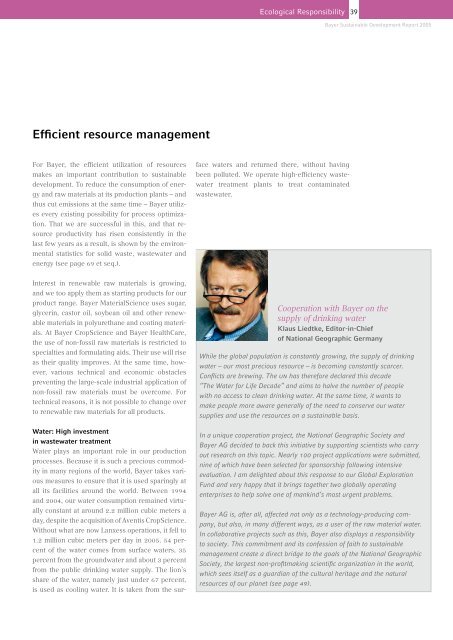Science For A Better Life - Bayer
Science For A Better Life - Bayer
Science For A Better Life - Bayer
Create successful ePaper yourself
Turn your PDF publications into a flip-book with our unique Google optimized e-Paper software.
Efficient resource management<br />
<strong>For</strong> <strong>Bayer</strong>, the efficient utilization of resources<br />
makes an important contribution to sustainable<br />
development. To reduce the consumption of energy<br />
and raw materials at its production plants – and<br />
thus cut emissions at the same time – <strong>Bayer</strong> utilizes<br />
every existing possibility for process optimization.<br />
That we are successful in this, and that resource<br />
productivity has risen consistently in the<br />
last few years as a result, is shown by the environmental<br />
statistics for solid waste, wastewater and<br />
energy (see page 69 et seq.).<br />
Interest in renewable raw materials is growing,<br />
and we too apply them as starting products for our<br />
product range. <strong>Bayer</strong> Material<strong>Science</strong> uses sugar,<br />
glycerin, castor oil, soybean oil and other renewable<br />
materials in polyurethane and coating materials.<br />
At <strong>Bayer</strong> Crop<strong>Science</strong> and <strong>Bayer</strong> HealthCare,<br />
the use of non-fossil raw materials is restricted to<br />
specialties and formulating aids. Their use will rise<br />
as their quality improves. At the same time, however,<br />
various technical and economic obstacles<br />
preventing the large-scale industrial application of<br />
non-fossil raw materials must be overcome. <strong>For</strong><br />
technical reasons, it is not possible to change over<br />
to renewable raw materials for all products.<br />
Water: High investment<br />
in wastewater treatment<br />
Water plays an important role in our production<br />
processes. Because it is such a precious commodity<br />
in many regions of the world, <strong>Bayer</strong> takes various<br />
measures to ensure that it is used sparingly at<br />
all its facilities around the world. Between 1994<br />
and 2004, our water consumption remained virtually<br />
constant at around 2.2 million cubic meters a<br />
day, despite the acquisition of Aventis Crop<strong>Science</strong>.<br />
Without what are now Lanxess operations, it fell to<br />
1.2 million cubic meters per day in 2005. 54 percent<br />
of the water comes from surface waters, 35<br />
percent from the groundwater and about 3 percent<br />
from the public drinking water supply. The lion’s<br />
share of the water, namely just under 67 percent,<br />
is used as cooling water. It is taken from the sur-<br />
Ecological Responsibility<br />
face waters and returned there, without having<br />
been polluted. We operate high-efficiency wastewater<br />
treatment plants to treat contaminated<br />
wastewater.<br />
39<br />
<strong>Bayer</strong> Sustainable Development Report 2005<br />
Cooperation with <strong>Bayer</strong> on the<br />
supply of drinking water<br />
Klaus Liedtke, Editor-in-Chief<br />
of National Geographic Germany<br />
While the global population is constantly growing, the supply of drinking<br />
water – our most precious resource – is becoming constantly scarcer.<br />
Conflicts are brewing. The un has therefore declared this decade<br />
“The Water for <strong>Life</strong> Decade” and aims to halve the number of people<br />
with no access to clean drinking water. At the same time, it wants to<br />
make people more aware generally of the need to conserve our water<br />
supplies and use the resources on a sustainable basis.<br />
In a unique cooperation project, the National Geographic Society and<br />
<strong>Bayer</strong> AG decided to back this initiative by supporting scientists who carry<br />
out research on this topic. Nearly 100 project applications were submitted,<br />
nine of which have been selected for sponsorship following intensive<br />
evaluation. I am delighted about this response to our Global Exploration<br />
Fund and very happy that it brings together two globally operating<br />
enterprises to help solve one of mankind‘s most urgent problems.<br />
<strong>Bayer</strong> AG is, after all, affected not only as a technology-producing company,<br />
but also, in many different ways, as a user of the raw material water.<br />
In collaborative projects such as this, <strong>Bayer</strong> also displays a responsibility<br />
to society. This commitment and its confession of faith to sustainable<br />
management create a direct bridge to the goals of the National Geographic<br />
Society, the largest non-profitmaking scientific organization in the world,<br />
which sees itself as a guardian of the cultural heritage and the natural<br />
resources of our planet (see page 49).


